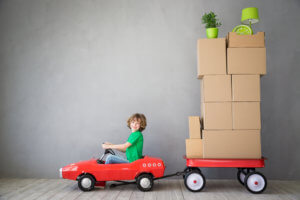Try as you might, you’re not likely to find a single person who finds moving to be a fun, easy, exciting time. Sure, it can be thrilling to move to a new place and change your surroundings. Moving (and the process leading up to it) is definitely less fun.
For kids, it’s even more challenging. Whether they’re toddlers who attach a lot of their identity to their home, or teenagers who are already going through enough personal/biological changes, the whole process can feel overwhelming and burdensome.
Preparing for a move is a great – and crucial – time to connect with your child and validate their feelings. Take the time to listen to them and talk through the process with them. Here are some great tips to support you in making the move easier on your kids:
Be Empathetic
Taking the time to see things from your kids’ perspectives will go a long way. Understanding that they may be confused or fearful when it comes to moving from everything they know will help you be more empathetic. These feelings are even stronger for younger kids or those who haven’t moved before. Their understanding of the world has been built within your home, and leaving it all behind is a big deal.
Kids can often feel helpless when a big change comes that they have no influence or control over. The more you can keep that in mind, the easier it will be for everyone involved.
Talk With Them
Once you’ve connected with your empathy, it’s time to connect with your kids. There’s no need to share every detail of the move, particularly if your kids are young. You should, however, make sure to help them understand what’s coming. Consider covering these points in your conversation:
- A move to a new home doesn’t mean everything is left behind. Your family, your routines, and their things are coming with them.
- Consider telling a story to help them connect with the idea and the process.
- Meet them at eye level. Whether you meet them by sitting on the floor or you pull up a chair next to you, meeting at a similar place feels safer and more relatable.
- Be present when talking with your kids. Pay attention to their non-verbal responses, like body language.
- Speak slowly and clearly, and allow them to respond.
- Find some places where you can let your child make choices themselves. Do they want to pick out their clothes or bring something special in the car with them? Let them decide so they feel involved.
Remember to start the conversations as early as possible. Saving it for the last minute will cause your kids to feel even less connected to the process.
Build Familiarity and Excitement
Are you moving locally? If so, we recommend familiarizing your kids with their new neighborhood. Take them for a visit, explore new parks, show them their new school, and visit a local cafe. The more you can do to help them understand their new surroundings before you get there, the better.
Whether you’re moving nearby or long-distance, you can still build excitement about the relocation. Explore – either in person or online – new things you’d like to visit once you arrive. Make a list and tell stories together about what it might be like when you are living in your new place.
Continue Your Routine
Kids thrive on routines. Preparing for a move can throw your schedule off, but try to hold on to your children’s routine to help them stay grounded. Bedtime routines, naptimes, playdates, and mealtimes are pillars in your kids’ days.
Start by maintaining them before moving day, and keep them up once you arrive in your new place. The surroundings may have changed, but they’ll find familiarity in knowing what to expect from the flow of their day.
Be Patient
Sorry to say: having one great conversation isn’t going to be enough. No matter how committed you are to all of the above, there will always be moments that feel rockier than others. That goes for both you, and your kids.
Remember to stick with empathy and be patient along the way. Pick your battles and remember, you can’t force them to be comfortable. If you’re getting overwhelmed or short on patience, don’t be afraid to ask for support from friends or family. Try to take some time to build memories together in your current home. That will help soothe both your and your child’s nerves.
Get Kids Involved
Help your kids feel more relaxed by getting them involved. Sure, you could probably pack a lot faster if you did it yourself – and you should, for most of the home. When it comes to their things, get them involved.
Let your kids decide what things to donate to other kids before you move. Make packing a project you do together, and be strategic about how you pack. Don’t pack their favorite things weeks in advance. You want them to feel at home as long as possible.


